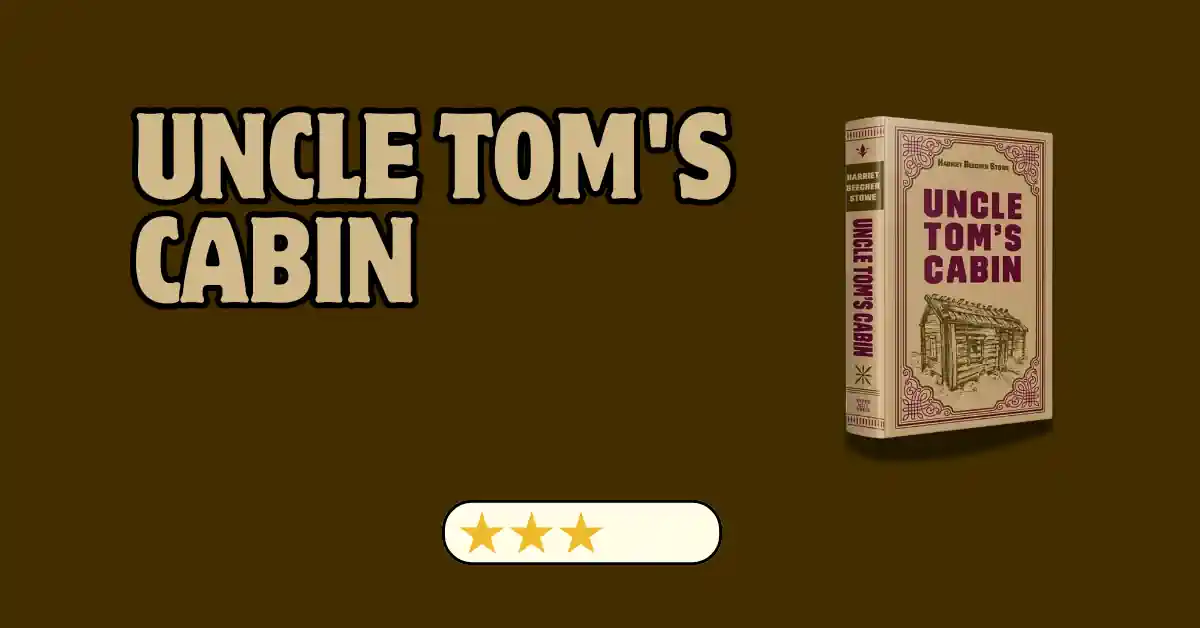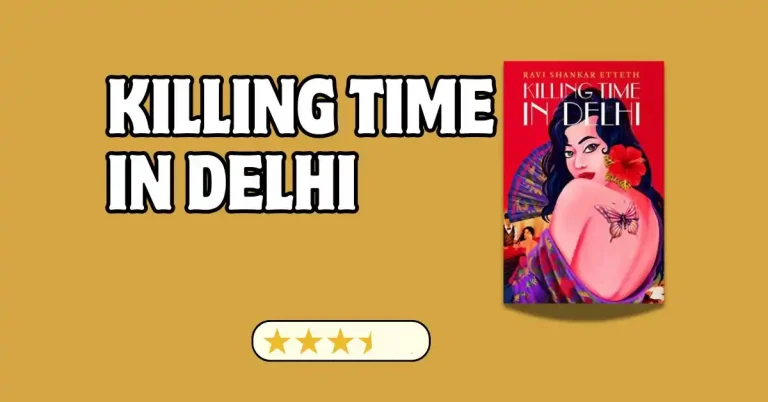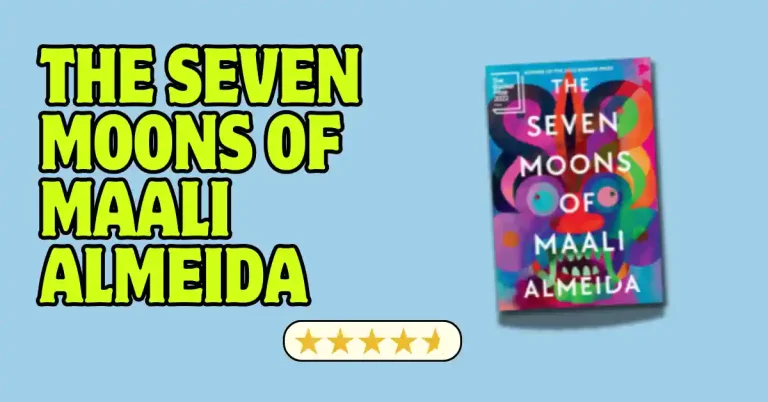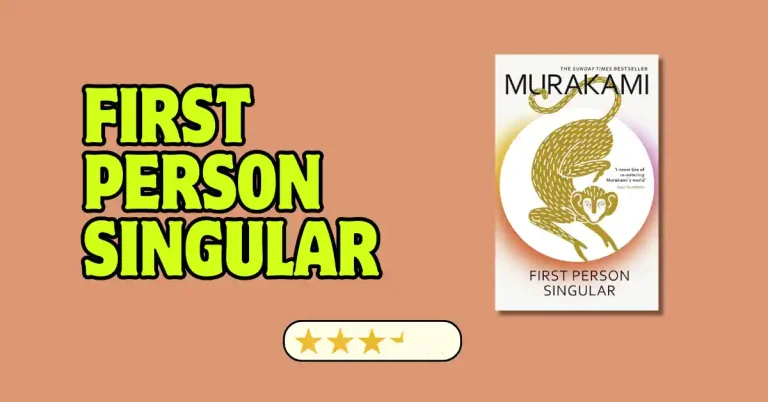Uncle Tom’s Cabin
There are some books you read and think, “That was beautiful.” You admire the writing. You appreciate the craft. You move on.
And then there are books that grab you by the shoulders and shake you. Books that don’t care about being elegant or subtle. Books that have something urgent to say and won’t shut up until you’ve heard it.
Harriet Beecher Stowe’s Uncle Tom’s Cabin is the second kind of book.
It’s not going to win any awards for beautiful prose. It’s not going to make you gasp at clever metaphors or perfectly constructed sentences. But it might make you understand, in a way you hadn’t before, why some books need to exist even if they’re not “perfect.”
Because this book didn’t just tell a story. It helped change the course of a nation.
Finding It in an Unexpected Place
I picked up Uncle Tom’s Cabin on a random afternoon at a children’s library. Strange place to read a book about slavery, right? But actually, there was something fitting about it.
Because this book was written with clarity. With purpose. Like someone trying to teach something important to people who might not want to hear it. Someone who knew they had to make their point so clearly, so powerfully, that it couldn’t be ignored or dismissed.
Stowe wasn’t trying to write the most beautiful novel of all time. She was trying to make people see slavery for what it really was. She was trying to reach into comfortable homes—homes where people didn’t think much about slavery or thought it wasn’t really that bad—and force them to confront the truth.
And here’s the thing: it worked.
People read this book and cried. They got angry. They started questioning things they’d always taken for granted. They started seeing enslaved people not as property or abstract concepts, but as human beings. As mothers and fathers and children. As people who suffered and loved and hoped, just like everyone else.
There’s a reason Abraham Lincoln supposedly greeted Stowe by saying, “So you’re the little woman who wrote the book that started this great war.” Whether he actually said it or not, the sentiment captures something real: this book had power. Real, measurable, world-changing power.
And that’s a rare thing for a novel to achieve.
Let’s Be Honest About the Writing
Before we go any further, let me be clear: the writing in Uncle Tom’s Cabin is not great.
It’s not terrible, but it’s not great either.
It plods along. It preaches—a lot. It stops the story to give you long moral lessons. It meanders into side plots. The characters sometimes feel more like walking moral lessons than real people. The dialogue can be stiff. The narrator jumps in constantly to tell you exactly what you should be feeling and thinking.
If this book came out today, without its historical significance, critics would probably tear it apart. They’d say it’s heavy-handed. That it’s too sentimental. That it doesn’t trust the reader to figure things out on their own. That it spells everything out too obviously.
And they wouldn’t be wrong.
If you’re looking for subtle, sophisticated, beautifully crafted prose, this isn’t the book. If you want complex moral ambiguity and nuanced character studies, you might be disappointed.
But here’s the thing: Stowe wasn’t trying to write that kind of book. She was trying to wake people up. She was trying to break through layers of denial and indifference and comfortable ignorance.
And sometimes, to do that, you can’t be subtle. Sometimes you have to be loud and clear and obvious. Sometimes you have to hit people over the head with your point because they’ve been avoiding it for too long.
So yes, the writing is flawed. But the power of what the book accomplished? That’s undeniable.
What the Book Actually Shows You
If you’ve never read Uncle Tom’s Cabin, you might have a vague idea that it’s about slavery and how bad it was. And yes, that’s true. But it’s worth understanding what Stowe actually showed her readers, because some of it was genuinely shocking for people at the time.
She showed families being torn apart. A mother jumping into an icy river with her child to escape slave catchers. Children being sold away from their parents, never to see them again. Women being sexually exploited by their owners. Men being beaten to death for refusing to betray their fellow slaves.
But she also showed something else—something that white readers especially needed to see: enslaved people as fully human. As complex individuals with thoughts and feelings and dignity and worth.
This might sound obvious now. Of course enslaved people were human. Of course they had feelings. But you have to understand—many white people in the 1850s genuinely didn’t think about it that way. Or if they did think about it, they pushed those thoughts aside because it was uncomfortable.
Slavery was something that happened far away, on plantations they never saw. Or it was just “how things were.” Or it wasn’t really that bad. Or enslaved people didn’t really suffer the way white people would because they were somehow different, less sensitive, less fully human.
Stowe forced her readers to confront all of those comfortable lies. She made them see enslaved people as mothers who loved their children just as much as any white mother. As husbands who would risk everything to keep their families together. As people with hopes and dreams and faith and courage.
She made it impossible to look away or pretend it wasn’t that serious.
And for many readers—especially women, who made up a huge part of her audience—this was devastating. They read about Eliza running across the ice with her baby, about mothers having their children ripped from their arms, about families destroyed, and they couldn’t help but imagine: What if that was me? What if someone took my child? What if my family was torn apart like that?
That identification, that emotional connection—that was Stowe’s weapon. And it was incredibly effective.
The Character We Got Wrong
Now here’s something interesting: the phrase “Uncle Tom” today is an insult. If you call someone an Uncle Tom, you’re saying they’re a sellout. Someone who betrays their own people to please those in power. Someone who’s weak, subservient, willing to bow and scrape to avoid conflict.
But if you actually read the book, the character Uncle Tom is nothing like that.
And I mean nothing like that.
This disconnect—between what “Uncle Tom” means in modern language and who Uncle Tom actually is in the book—is fascinating. And honestly, kind of tragic. Because somewhere along the way, we completely misunderstood this character. Or maybe we deliberately distorted him. Either way, we got it wrong.
Who Tom Really Is
Let me tell you about the actual Uncle Tom in Stowe’s book.
Tom is an older enslaved man. He’s described as strong, capable, deeply religious. He’s been enslaved his whole life, but he’s maintained his dignity, his faith, and his sense of right and wrong.
When the book starts, Tom is living on a relatively decent plantation in Kentucky. His owner isn’t particularly cruel. Tom has a wife and children. He’s as content as anyone can be while being someone else’s property.
But then his owner gets into debt. And to pay that debt, he has to sell Tom. Tom’s family begs him to run away. They could try to escape together, head North, try for freedom.
But Tom makes a different choice. He knows that if he runs, his owner will have to sell other enslaved people to make up the money. Other families will be split up. So Tom goes willingly. He accepts being sold to save others from that fate.
Now, you might read that and think: See? He’s passive. He’s accepting his fate. He’s being subservient.
But keep reading.
Tom gets sold down South. He ends up on a plantation in Louisiana, owned by a truly evil man named Simon Legree. This is not a kind owner. This is not someone you can reason with. This is a brutal, violent man who sees enslaved people as nothing more than tools to be used up and thrown away.
Legree tries to break Tom. He beats him. He threatens him. He orders Tom to whip other enslaved people as punishment for their “disobedience.”
And this is where you see who Tom really is.
Tom refuses. He will not whip another person. He will not inflict pain on someone else, no matter what Legree does to him.
So Legree has him beaten. Brutally. Mercilessly. To the point of death.
And Tom still refuses to betray his principles.
There’s another crucial moment: two enslaved women, Cassy and Emmeline, are planning to escape. They tell Tom about their plan. And Legree comes to Tom and demands to know where they are.
Tom knows where they are. He could tell Legree. It would save him from another beating. It would probably save his life.
He refuses. He will not betray them. He will not tell Legree anything, no matter what Legree does to him.
And Legree beats him to death for it.
Tom dies rather than betray his fellow enslaved people. He dies rather than compromise his principles. He dies rather than do something he believes is wrong.
Tell me: Is that weakness? Is that subservience? Is that someone betraying his own people?
No. That’s strength. Incredible, almost impossible strength.
That’s someone choosing to die rather than become what his oppressor wants him to be.
The Strength in Nonviolence
Here’s what I think people misunderstand about Tom: they see his nonviolence and his faith as weakness. They think he should have fought back. Should have killed Legree. Should have rebelled violently.
And look, I understand that instinct. Violence against oppressors can absolutely be justified. Enslaved people who rebelled, who fought back, who killed their enslavers in self-defense—they were completely justified. They had every right.
But Tom makes a different choice. And his choice isn’t about being too scared to fight or too weak to resist. It’s about holding onto his faith, his principles, his belief in something beyond this world and its violence.
Tom’s Christianity isn’t about making his enslavers comfortable. It’s not about being a “good slave” so white people will like him. It’s about maintaining his own integrity, his own soul, in circumstances designed to destroy both.
When Tom refuses to whip another enslaved person, he’s not being passive. He’s actively resisting. He’s saying: You can own my body, but you can’t own my soul. You can kill me, but you can’t make me become like you. You can’t make me inflict the same violence that’s been inflicted on me.
That’s not weakness. That’s a kind of strength most people don’t have.
Think about it: How many people, when faced with torture and death, would hold onto their principles? How many would say “I don’t care what you do to me, I’m not doing that”? Most of us would break. Most of us would tell ourselves we had no choice, that survival was more important, that we’d make it up to the people we hurt later somehow.
Tom doesn’t break. And that makes him powerful in a way that violence alone could never achieve.
Now, I’m not saying nonviolence is always the answer. I’m not saying enslaved people should have just endured rather than rebelling. Different people made different choices, all of them valid.
But Tom’s choice—the choice to resist through maintaining his own moral code even when it costs him everything—that’s not betrayal. That’s not cowardice. That’s one of the hardest, bravest things a person can do.
And somewhere along the way, we forgot that. We took this character who represented unbreakable moral courage and turned him into a symbol of spineless compliance.
That’s a tragedy. Because we lost something important in that distortion. We lost a model of resistance that doesn’t look like what we expect resistance to look like, but that’s no less powerful for being different.
Why This Matters for Readers Today
If you’re not American, or if you didn’t grow up learning about slavery in school, this book is an education. A difficult, necessary education.
It shows you what slavery actually meant. Not in abstract historical terms, but in human terms. What it meant to live as someone’s property. What it meant to watch your children be sold away from you. What it meant to have no legal protection, no rights, no control over your own body or life.
It shows you the different forms slavery took—from owners who thought they were “kind” but still owned human beings, to brutal plantation owners who worked people to death. It shows you how the system worked, how it was justified, how it corrupted everyone it touched.
But it also shows you resistance. It shows you people who never stopped being human, never stopped loving, never stopped hoping, never stopped fighting in whatever ways they could.
And it shows you the cost of complicity. The ways that “good” people—people who thought slavery was wrong but didn’t want to get involved, who looked the other way, who benefited from the system without directly participating—were still part of the problem.
That lesson, honestly, is still relevant. Because we still do that. We still benefit from systems of oppression while telling ourselves we’re not really part of it because we’re not the ones directly inflicting harm. We still look away from injustice because addressing it would be uncomfortable or costly.
Uncle Tom’s Cabin forces you to confront that. It doesn’t let you off the hook. It makes you ask: What would I have done? Would I have spoken up? Would I have helped? Or would I have been one of the people who knew it was wrong but did nothing?
Those aren’t comfortable questions. But they’re important ones.
What About the Problems?
Now, I can’t talk about this book without acknowledging its problems. Because it has them. Real ones.
First, there’s the racism. Yes, even in this anti-slavery book, there’s racism. Stowe had good intentions, but she was still a white woman writing in the 1850s. Some of her descriptions of Black characters rely on stereotypes. Some of her ideas about race—like the notion that Black people were naturally more “childlike” or emotional—are deeply problematic.
The dialect she uses for Black characters can be hard to read and sometimes veers into caricature. The way she describes physical features sometimes relies on ugly stereotypes.
And then there’s the ending. After everything Tom goes through, after showing all this suffering and injustice, Stowe’s proposed solution is… send Black people back to Africa. Specifically, to Liberia.
She presents this as a hopeful ending—freed enslaved people going to build a new society in Africa, spreading Christianity and “civilization.” But from a modern perspective, it reads as a cop-out. As if the problem isn’t slavery and racism in America, but the presence of Black people. As if the solution is to remove Black people rather than change the society that enslaved them.
It’s disappointing. Frustrating. It undercuts some of the book’s power.
But here’s the thing: you can acknowledge these flaws while still recognizing what the book accomplished. You can criticize Stowe’s blind spots while appreciating her courage in writing the book at all. You can see both the problems and the power.
Nothing is perfect. No person, no book, no movement. We can hold multiple truths at once: that this book helped change history, and that it reflected the racist assumptions of its time. That it moved people to action against slavery, and that it didn’t go far enough. That it gave voice to the suffering of enslaved people, and that it was still written from an outsider’s perspective with all the limitations that implies.
Why It’s Still Worth Reading
So with all those flaws, why read it today?
Because it’s a piece of history. Not just a book about history, but a book that made history. That changed minds. That helped push a nation toward confronting its greatest sin.
Because it shows you the power of storytelling. How a novel—not a political treatise, not a philosophical argument, but a story about made-up people—can change the world.
Because it reminds you that sometimes “good writing” isn’t the most important thing. Sometimes urgency matters more than elegance. Sometimes making people feel and care matters more than crafting perfect sentences.
Because it teaches you about a crucial period in human history. About what slavery was really like. About how it was justified. About how it was resisted. About how it finally ended—and at what cost.
Because it makes you think about complicity and courage. About what you would do in similar circumstances. About how easy it is to look away from injustice. About how hard it is to stand up for what’s right when it costs you something.
And because it shows you who Uncle Tom really was, before his name became an insult. It lets you meet the actual character and decide for yourself whether his choice was weakness or strength.
The Book That Belongs in Schools
If I were in charge of school reading lists, I would absolutely include Uncle Tom’s Cabin. Not because it’s perfectly written. Not because it has no problems. But because it’s important.
Students should know that books can change the world. They should see an example of writing that mattered, that did something, that moved people to action.
They should learn about slavery from a book that made people actually feel the horror of it, not just understand it intellectually.
They should grapple with a text that’s both powerful and flawed, that has both important messages and problematic elements. Because that’s what real literature is often like—complicated, messy, reflecting both the best and worst of its time.
They should meet Uncle Tom and understand how his character got distorted over time. They should think about what real moral courage looks like. They should debate whether his choices were right or wrong, and what alternatives he might have had.
They should discuss the ending and what’s wrong with it. They should talk about how even people with good intentions can have blind spots. They should learn to appreciate what a work accomplished while still critiquing its limitations.
These are all valuable lessons. And Uncle Tom’s Cabin is a perfect text for teaching them.
Books That Changed History
In the end, here’s what strikes me most about Uncle Tom’s Cabin: it reminds you that books can matter. Really matter. Not just in some abstract “literature is important” way, but in concrete, measurable ways.
This book changed minds. It moved hearts. It made slavery real and personal for people who’d never thought about it much before. It helped create the moral climate that made the Civil War possible—and necessary.
Could the book have been better written? Sure. Could it have avoided some of its racist assumptions? Absolutely. Could it have proposed better solutions? Without a doubt.
But it did something that matters more than any of those things: it made a difference.
And in the end, isn’t that what we should want from books that tackle important subjects? Not perfection, but impact. Not flawless prose, but the courage to say something that needs to be said, even if it’s uncomfortable, even if it makes enemies, even if it’s not beautifully crafted.
Stowe wrote this book because she couldn’t stay silent anymore. She saw injustice and suffering and she used the only weapon she had—her pen—to fight against it.
The book isn’t perfect. But it’s necessary. It’s important. It’s powerful.
And more than 170 years after it was published, it still has things to teach us. About slavery, yes. About American history, definitely. But also about courage. About resistance. About the cost of standing up for what you believe is right. About the power of storytelling. About how easy it is to distort history. About how comfortable lies get challenged by uncomfortable truths.
Summing It Up
Would I call Uncle Tom’s Cabin a great novel in the literary sense? No, probably not.
Would I call it an important book? Absolutely. Without question.
It belongs in libraries. It belongs in schools. It belongs in conversations about literature and history and social change. It belongs on the shelf reserved for books that didn’t just observe history—they helped shape it.
It’s not an easy read. Parts of it are a slog. Parts of it are problematic. Parts of it might make you uncomfortable or frustrated or angry.
But it’s worth reading anyway. Because it shows you what one book, written by one woman who was angry about injustice, could accomplish. It shows you that words matter. That stories matter. That sometimes a flawed book with an urgent message can change the world more than a perfect book with nothing important to say.
And it introduces you to the real Uncle Tom—not the caricature, but the man. The man who chose faith over violence, principles over survival, integrity over life itself.
You might disagree with his choices. You might wish he’d made different ones. But you can’t deny his courage. You can’t call him weak or subservient or a sellout.
He was none of those things. He was a man who held onto his humanity and his faith in circumstances designed to destroy both. And he died rather than compromise on what he believed was right.
That’s not weakness. That’s strength. The kind of strength most of us will never have to prove we have, thank God.
So read the book. Struggle with it. Criticize it. Appreciate it. Learn from it.
But don’t dismiss it. Because books like this—books that changed the course of nations, that moved millions of people to see the world differently—don’t come along very often.
And when they do, even with all their flaws, they deserve our attention.
Uncle Tom’s Cabin isn’t just a book about the past. It’s a reminder that books can shape the future. That stories can change minds. That one person with a pen and something to say can make a difference.
And that’s a lesson worth remembering.

Want to read Uncle Tom’s Cabin and witness how a novel helped awaken moral outrage against slavery?
Disclosure: This is an Amazon affiliate link. I may earn a small commission at no extra cost to you.






